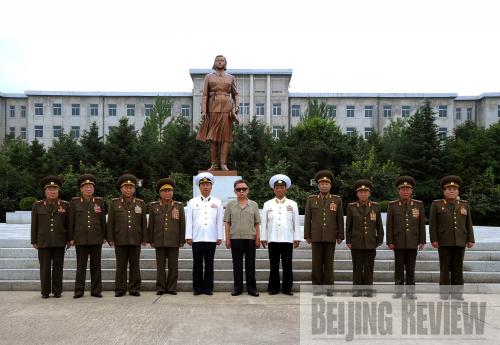|
 |
|
TOP GUN: Leader of the Democratic People's Republic of Korea (DPRK) Kim Jong Il inspects Kim Jong Suk Naval University on August 12. Kim said the navy plays an important role because the DPRK is a maritime country "surrounded by seas on three sides," according to the official Korean Central News Agency (XINHUA/KCNA) |
In early August, a photo of former U.S. President Bill Clinton shaking the hand of the leader of the Democratic People's Republic of Korea (DPRK), Kim Jong Il, was beamed around the world. Clinton might not have been smiling, and he probably didn't want to be there—but in order to secure the release of two U.S. citizens who had been imprisoned early in 2009, he had made the trip. And with their release, he had justified his being there.
North Korea's challenge to international security and stability is serious. Chinese, Russian, Japanese, European and American politicians and policy makers all recognize this. For many years, they have wrestled with what to do about dealing with the DPRK. President Clinton himself would remember the very difficult period just before and after the death of former DPRK leader Kim Il Sung in 1994. Escalating tensions were only diffused by the visit of former President Jimmy Carter to Pyongyang to meet face to face with Kim Il Sung. A deal was done then that, in order to stop production of nuclear materials, the United States and other partners would help to supply a water cooler and energy producing technology. This agreement has never been fully implemented because of political squabbling ever since. In the last decade and a half, the DPRK has suffered from famine, and instability. But time and again, Kim Jong Il has made it clear that he is in charge, and is willing to force the hand of the international community. As far as getting the attention of the rest of the world, he has been successful. No other country with such a small economy and so few people attracts the worried attention of the international community. But as one South Korean government official stated in London this spring, the world is starting to get very weary of the DPRK's behavior. The problem is that there is no real consensus on how to deal with it.
Despite what many think, there is very little appetite to see the DPRK fall apart. Ironically, with some moderation of its position and a little compromise, the DPRK would unlock grateful international support. For South Koreans, the idea of having to absorb an economy with as many problems as the DPRK has is, frankly, horrifying. Their economy is one of the strongest in the region. They have built up a remarkable industrial sector, particularly in hi-tech, in the last decades. Some of their companies are globally recognized and successful. Unification would carry almost insurmountable costs, putting together one entity with average per-capita gross domestic product (GDP) of $29,000, with another where, from what little we know—information about internal conditions in North Korea is very hard to come by—the per-capita income per annum barely reaches $500. Former President of South Korea Kim Dae Jong looked at the possible unification between the north and the south based on the model of West and East Germany. He concluded that the differences were now too extreme. Any unification would need a long, long transition to be manageable. The current stance of the DPRK makes that even harder to see happening.
For Japan, there is the very sensitive issue of the abductees, a group of Japanese nationals taken in the most bizarre circumstances in the 1970s and 1980s by North Korean intelligence agents, and only finally accounted for by Kim Jong Il when he met Japanese Prime Minister Junichiro Kozuimi in 2002. It is indicative of the DPRK's naivety in international relations that this "confession" during an important visit, while no doubt intended as a friendly gesture, came as such a shock to Japanese public opinion that it effectively put relations between the two countries back into the deep freeze. They have never really recovered, and are unlikely to do so until there is a full accounting both for why the abductees were taken, and what really happened to them.
|
